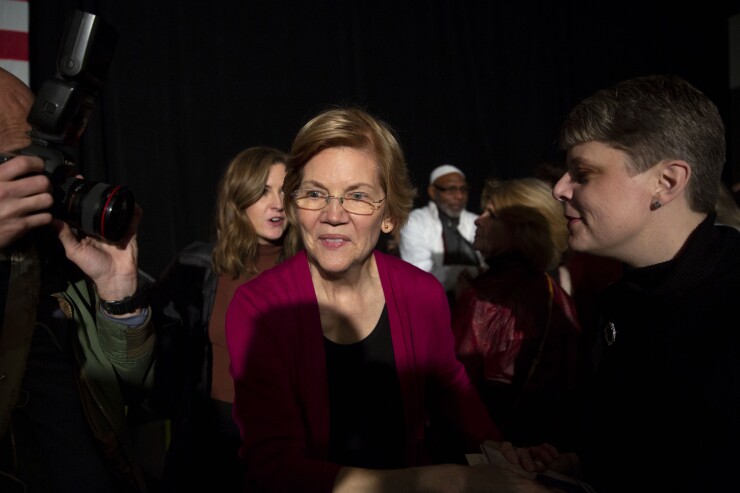WASHINGTON — Housing policy continues to be in vogue in the capital, with officials zeroing in on a
Historically, housing is a relatively obscure topic in national elections, but that could change in the 2020 race. At least 16 of the 23 Democratic presidential candidates have already mentioned affordable housing on the trail. Four have released policy proposals to address the rising cost of owning or renting a home.
A spotlight on housing is consistent with a broader Democratic effort to expand the party's base, but also the result of soaring home and rent prices, experts say.
“The candidates are reacting to the fact that American families are feeling tremendous challenges meeting their housing costs as wages have essentially stagnated,” said Marion McFadden, the senior vice president of public policy at Enterprise Community Partners.

The number of Americans burdened by housing costs has increased by almost 14 million in the last 30 years, and almost half of renters now pay more than half of their income on rent, according to a Harvard University report.
“It's a fundamental policy failure and economic failure, but it also has an obvious audience for Democrats particularly to sort of motivate this younger base that they're going to need to win,” said Pete Harrison, a senior adviser for housing at Data for Progress.
Harrison said Hillary Clinton's 2016 presidential campaign missed an opportunity to focus on housing, and the 2020 candidates have a chance to engage a whole new class of voters by discussing solutions to the issue.
While President Donald Trump will likely be able to run on a healthy economy, mortgage rates are creeping up, impacting both Republican and Democrat voters.
“Now that we have a housing cost crisis in every state in the country and politicians are hearing about it from their urban constituents, from their suburban constituents, from their rural constituents, it's just become impossible to ignore for any politician that's actually listening to voters and actually listening to people in their community,” said Henry Kraemer, a housing fellow at Data for Progress.
Some think housing policy could play a role in Trump’s re-election campaign as well. The president himself
“We will consider taking other administrative actions to modernize our housing programs and to ensure more affordable housing to get rid of ridiculous regulations so you can build and build quickly and build beautifully,” said Trump.
The government-sponsored enterprises could enter the conversation or be the topic of a question at a presidential debate, especially as the Trump administration readies administrative and legislative
“Certainly it's been in the news more with [Federal Housing Finance Agency Director] Mark Calabria doing lots of public speeches and lots of interviews, and the Trump administration asking for plans from Treasury and [the Department of Housing and Urban Development],” she said. “Depending on the splash that that makes in the media and in kind of the public consciousness, it might come up on the campaign trail too.”
Four Democratic candidates — Sens. Elizabeth Warren, D-Mass., Kamala Harris, D-Calif., Cory Booker, D-N.J., and Bernie Sanders, I-Vt. — have released proposals directed at tackling affordable housing, and Yentel expects four or five other candidates to come out with their own proposals in the next month.
“Many of them, I think, want to get those out before the debates in June, which is sort of another marker for us,” she said. “The fact the candidates feel like they want to get their housing proposals out there before the debates because they're anticipating there may be a question is also pretty historic for us here in the housing field.”
Warren has put out “by far the most comprehensive plan,” said Kraemer. Her American Housing and Economic Mobility Act, which she detailed in a March blog post, aims to reduce rents by 10% and invest $500 billion over the next 10 years for the construction of affordable housing units.
“We’re not going to solve our housing crisis by nibbling at the edges. We need to tackle it head-on — with big, comprehensive solutions that match the size of the problems we have,” Warren wrote in an op-ed for the Reno Gazette Journal. “That’s what my housing plan for America does, and enacting this plan will be a top priority of my administration — because every American deserves a safe, decent and affordable place to live.”
But for Kraemer, none of the current policy proposals go far enough to enact sweeping change that he says would completely solve an affordable housing crisis.
“All of them would make a difference,” he said. “Some of them would make a big difference, but so far none of them will actually provide stable, affordable homes for the 7 million people who need them immediately.”
And while voters might generally feel the lack of affordable housing in their communities, only a small fraction pay attention to the mechanics of housing finance, such as Fannie and Freddie or mortgage lending. Candidates will have to put in work to connect the technical policy details with the broader issue, said McFadden.
“The average American does not know very much about housing in this country and where it comes from, so there’s a lot of education that needs to be done as well,” she said. “It will resonate with people who are feeling the pinch on affordable housing, but there’s still a lot to be done to make the average American understand why are we talking about this.”





